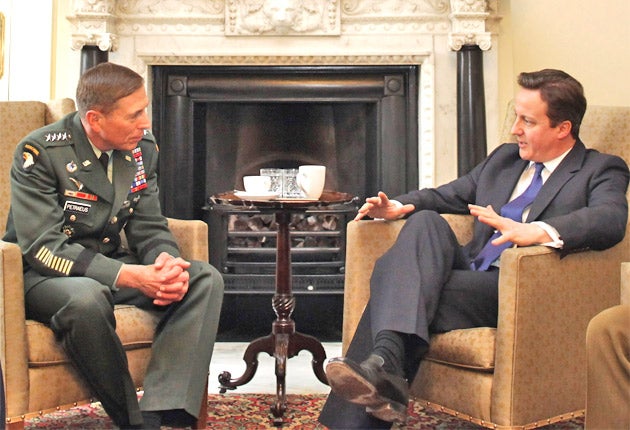Cameron: What looked like a triumph is beginning to seem a curse

David Cameron had intended to spend the past 48 hours working on the final details of today's Budget. Instead his time has been consumed by the growing challenges – military and diplomatic – posed by the attacks on Libya.
His early triumph in building a majority in the UN Security Council for intervention against Gaddafi's forces was lauded by MPs of all parties last week and received overwhelming backing in a Commons vote on Monday. But the practical problems of fighting a protracted campaign against a determined opponent – and of maintaining international consensus for the action – are beginning to crowd in.
Mr Cameron and the Foreign Secretary William Hague have spent much of the past two days on the phone to world leaders determined to avert any fractures in the coalition targeting Gaddafi's regime. Crucial to the drive has been Amr Moussa, the Secretary General of the Arab League, who briefly triggered panic in Whitehall when he appeared to condemn the first wave of air strikes.
There have also been contacts with the Crown Prince of Abu Dhabi – Mr Cameron's personal sounding-board in the region – and the Turkish Prime Minister, as well as talks yesterday in Downing Street with the Saudi Arabian Foreign Minister, Saud al Faisal.
Mr Cameron's constant aim has been to include as many Middle Eastern countries as possible in the planning, execution and financing of the action against Libya.
He is highly sensitive to the accusation that an operation dominated by the United States and western European nations could be caricatured as a Christian-Muslim conflict.
The Prime Minister is also fighting diplomatic fires on other fronts, notably battling to win support for his desire for command of the Libyan operation to be taken out of American hands and transferred to Nato.
It has been an uphill struggle as he tries to balance diverging views: France is instinctively wary of Nato taking over at all, while both Germany and Turkey are hostile to the very principle of the operation.
He also knows there is work to be done in repairing transatlantic relations after Robert Gates, the US Defense Secretary, rubbished "loose talk" about no-fly zones and Downing Street signalled its frustration over the conflicting signals coming from the White House over Libya.
Mr Cameron has been assiduous in holding meetings with his newly-created National Security Council to discuss the developments in Libya. But problems in the Whitehall communications machine were highlighted after ministers and the Chief of the Defence Staff produced very different messages over whether Gaddafi could be targeted by jets and missiles.
Meanwhile, the Prime Minister faces a difficult dilemma over forging links with the rag-bag of rebel groups in eastern Libya.
Whitehall sources believe Paris was precipitate in recognising them as the Libya's legitimate government and are still trying to collect information about the key opposition figures and their backgrounds. But equally the Cameron government does not want to be left trailing behind if Gaddafi is ousted and a new administration rapidly emerges from the rubble.
Mr Cameron faces a further problem if a messy stalemate emerges with Gaddafi clinging on in the west. That might deter the fainter hearts in Nato from further action but the Prime Minister fiercely opposes such a solution.
Subscribe to Independent Premium to bookmark this article
Want to bookmark your favourite articles and stories to read or reference later? Start your Independent Premium subscription today.

Join our commenting forum
Join thought-provoking conversations, follow other Independent readers and see their replies